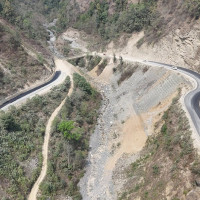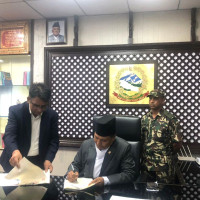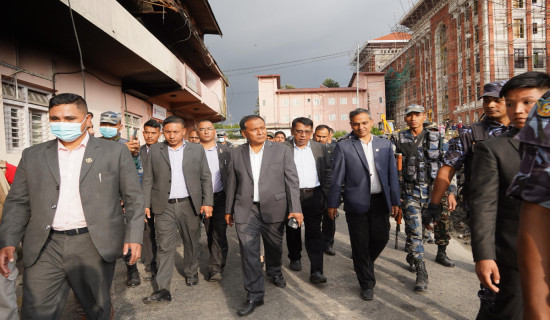- Thursday, 18 September 2025
Security For Reporters
News reporters face significant dangers due to the nature of their work; they are required to cover the news from conflict zones, sites of natural disasters and demonstrations. They are often exposed to hazardous conditions while covering protests and war zones. One such burning example is the death of journalist Suresh Rajak after the pro-monarchist demonstrators set fire to a house in Tinkune from where he was reporting.
This incident shows how vulnerable journalists are and how risky their working conditions can be. However, most of the media houses where they work seldom cover their medical and life insurance. Both media houses and the state seem indifferent to the issues of the journalists, their protection and providing them with medical insurance.
Reporting in the war zones often takes a toll on their mental health as well; they experience the trauma that the people in the war zones face. Health insurance is very important for reporters. When they feel secure that their medical bill during emergencies are covered, they would feel a sense of security and would be more focused on their work. It acts like a backup, which helps them to report some world's toughest stories. Having some sort of financial protection when medical expenses are very high in a country like ours can act as a bonus for security. Likewise, journalists often face threats, intimidation and scrutiny as they expose corruption and become the voice of the voiceless.
Health insurance is not just a benefit but a critical safeguard, so the country should develop policies to provide medical insurance for its journalists. Likewise, FNJ should also coordinate with the concerned authorities to cover medical insurance for the journalists throughout the country. Karnali Chief Minister Yam Lal Kandel, while handing over the insurance policies to the journalists, said, "Journalism is a profession that always seeks truth and amplifies the voice of the people. The state’s concern and protection are essential for those carrying out such sensitive and difficult duties."
At a time when journalists are facing threats and scrutiny, this move by the Karnali Province government reiterates the government's commitment to press freedom and the safety of journalists. It also reflects the state's responsibility for the journalist's safety, the state's support for human rights and commitment to democratic values.
Karnali government's move to provide health insurance coverage to 693 journalists of the province is an exemplary task that should be followed by other provincial governments as well. Journalists are entitled to receive medical treatment coverage of up to Rs. 70,000 annually. FNJ, which is working to safeguard the welfare of all working journalists and protect their rights, should work to bring all the working journalists under the scheme of medical insurance by facilitating cooperation with the provincial governments and insurance companies.
Renowned media outlets also appear indifferent in offering incentives such as health insurance and other professional securities to journalists who work tirelessly in hazardous conditions. Additionally, working journalists face the risk of layoffs, and they don’t get their remuneration on time. The government should make sure these media companies also work for financial and health-related securities of their working journalists.



-original-thumb.jpg)

-square-thumb.jpg)
-original-thumb.jpg)










